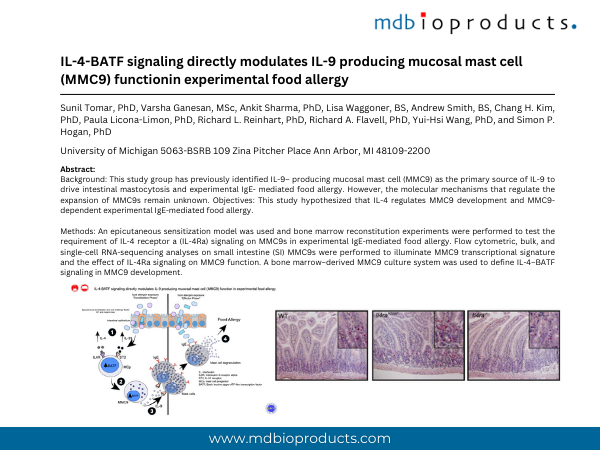
Featured Publication in Focus: IL-4–BATF signaling directly modulates IL-9 producing mucosal mast cell (MMC9) function in experimental food allergy.
Apr 16 , 2024
Authors:
Sunil Tomar, PhD, Varsha Ganesan, MSc, Ankit Sharma, PhD, Lisa Waggoner, BS, Andrew Smith, BS, Chang H. Kim, PhD, Paula Licona-Limon, PhD, Richard L. Reinhart, PhD, Richard A. Flavell, PhD, Yui-Hsi Wang, PhD, and Simon P. Hogan, PhD
University of Michigan 5063-BSRB 109 Zina Pitcher Place Ann Arbor, MI 48109-2200
American Academy of Allergy, Asthma & Immunology
----------------------
Products referenced:
Catalogue # M036005N
Catalogue # 101001B
T1/ST2 (IL-33 R) Mouse, Monoclonal Antibody, Biotinylated, 0.5 mL
----------------------
ABSTRACT
Background: This study group has previously identified IL-9– producing mucosal mast cell (MMC9) as the primary source of IL-9 to drive intestinal mastocytosis and experimental IgE- mediated food allergy. However, the molecular mechanisms that regulate the expansion of MMC9s remain unknown. Objectives: This study hypothesized that IL-4 regulates MMC9 development and MMC9-dependent experimental IgE-mediated food allergy.
Methods: An epicutaneous sensitization model was used and bone marrow reconstitution experiments were performed to test the requirement of IL-4 receptor a (IL-4Ra) signaling on MMC9s in experimental IgE-mediated food allergy. Flow cytometric, bulk, and single-cell RNA-sequencing analyses on small intestine (SI) MMC9s were performed to illuminate MMC9 transcriptional signature and the effect of IL-4Ra signaling on MMC9 function. A bone marrow–derived MMC9 culture system was used to define IL-4–BATF signaling in MMC9 development.
Results: Epicutaneous sensitization– and bone marrow reconstitution–based models of IgE-mediated food allergy revealed an IL-4 signaling-dependent cell-intrinsic effect on SI MMC9 accumulation and food allergy severity. RNA-sequencing analysis of SI-MMC9s identified 410 gene transcripts reciprocally regulated by IL-4 signaling, including Il9 and Batf. In silico analyses identified a 3491-gene MMC9 transcriptional signature and identified 2 transcriptionally distinct SI MMC9 populations enriched for metabolic or inflammatory programs. Employing an in vitro MMC9-culture model system showed that generation of MMC9-like cells was induced by IL-4 and this was in part dependent on BATF. Conclusions: IL-4Ra signaling directly modulates MMC9 function and exacerbation of experimental IgE-mediated food allergic reactions. IL-4Ra regulation of MMC9s is in part BATF- dependent and occurs via modulation of metabolic transcriptional programs. (J Allergy Clin Immunol 2021;147:280-95.)
To continue reading and to download the publication:
